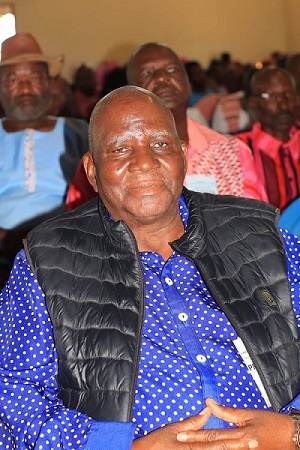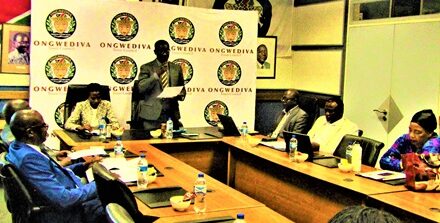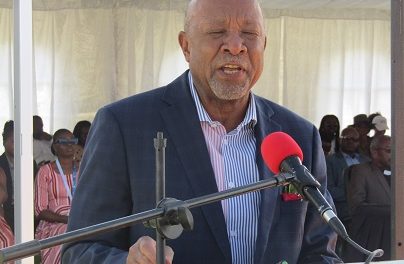By Elina-Ombili Shishaki /
Oukwanyama Traditional Authority will not hide any information from the public, nor deny anybody access to any information in its possession.
This was said by the spokesperson of the Oukwanyama Traditional Authority, Mr Andrew Naikaku.
Naikaku said this in response to queries from Omutumwa.
In the Namibian society (a society with high levels of inequalities and low citizen participation in governance processes, a nation with abundant natural resources but a nation wallowing in abject poverty) not everyone wants transparency.
Not everyone wants openness, accountability, easy access by the public to any information which may be in the possession of those who hold the keys of power in a country where the rich get richer while the poor get poorer by the day.
Thus Omutumwa was looking for Oukwanyama Traditional Authority’s view on the Access to Information Act.
The Access to Information Act (ATI), Act No. 8 of 2022, is one legislative authority that (once operational) will compel both public and private entities to open up and take full responsibility in ensuring that information is easily accessible to the public.
The ATI is an effort by those who want to come up with methods which promote transparency in the society, those working to create an environment where all decisions made in the name of the public may be accessible for public scrutiny, so as to ensure that those in decision-making positions are answerable to the public.
The Act is thus a powerful tool in the hands of the citizens, the power to demand for their rights, the right to be informed.
While traditional authorities are included in the Act as a part of public institutions, the traditional authorities are known to be such public institutions which are answerable to their chiefs more than to anybody else. Traditional authorities are also known to follow their own traditions, customs and practices more than they care about following anything.
Omutumwa thus visited the Oukwanyama Traditional Authority to seek for its voice on this ground-breaking legislation which aims at creating transparency, openness and a democratic society where decision-makers are accountable to the public and always prepared to disclose any information relating to their work in serving the public.
Oukwanyama is a traditional kingdom with a long history. Especially well-known is the leadership of King Mandume Ya Ndemufayo who 100 years ago died in battle fighting colonialists. He is honoured as a National Hero in both Namibia and Angola.
Today Queen Martha Mwadinomho Ya Kristian Nelumbu, who has reigned over the Ovakwanyama people for almost 19 years, is the head of the Oukwanyama Traditional Kingdom.
Ya Kristian Nelumbu is the first woman in history to head Oukwanyama kingdom. Reigning from her Omhedi palace, in Ohangwena Region, the Queen is the last authority where issues pertaining to Oukwanyama are concerned.
Thus Omutumwa sat down with Mr Naikaku, who also serves as the Advisor for Community Courts of the Oukwanyama kingdom, to get a hint of how the Access to Information Act will likely get to operate in the Oukwanyama kingdom.
“I am not aware that there is such an Act, it is my very first time to get a whiff of it,” said Naikaku.
“However, my responsibility is quite similar to what is required by this Act. My role is to share out information, to enable an effective sharing of information between the public and the Oukwanyama Traditional Authority, and report back to the Queen.”
Naikaku emphasised that his responsibilities revolve around information sharing and engaging with the public.
“It is the right thing to always provide information needed by people, it can encourage and uplift the nation. Every institution has a responsibility to address the issues outlined in the Access to Information Act as it is a matter of public interest.”
He highlighted the importance of having reliable information, saying that this Act will bring many positive changes in the society.
“Such is an Act that will give freedom to those in search of information to acquire correct and up-to-date information that is required,” he said.
“If a person gets the right information from the right authority they will at least know how to present and use such information in an unbiased manner.”
When asked whether the Oukwanyama Traditional Authority will embrace the ATI, and accordingly open up and share all information, or whether there is information which is restricted or ‘deemed confidential’ Naikaku responded that the Oukwanyama Traditional Authority is known for its transparency, and it is not secretive about any kind of information.
“With us here there are no secrets to hide, and no information has restrictions on it, provided that the one requesting has a valid reason for asking for the information, and can say how such information will be handled,” said Naikaku.
But he pointed out that the Authority will only not release information which is incomplete or yet to be reviewed before being disclosed to the public to avoid misconception and misinformation.
“The Act is there to equip us – the decision-makers – with necessary skills and to have a better understanding of how to deal with requests for any kind of information. This will bring about changes in how traditional authorities operate.
“Although there are many traditional laws and practices that are followed by the Oukwanyama Traditional Authority we still abide by the Namibian Constitution. Therefore, I don’t foresee any conflict with the Access to Information Act.
“All I can say is to urge the youth, especially those that are doing research or in search of all kinds of information to always follow the right procedures required to acquire accurate information.”
In the photo: Oukwanyama Traditional Authority’s Spokesperson, Mr Andrew Naikaku. [Photo contributed]

[NB. This article was produced with the financial support of the Namibia Media Trust, through the New Voices, New Narratives in Public Policy Discourse project. Its contents are the sole responsibility of Omutumwa and do not necessarily reflect the views of the NMT nor any of its partners.]







